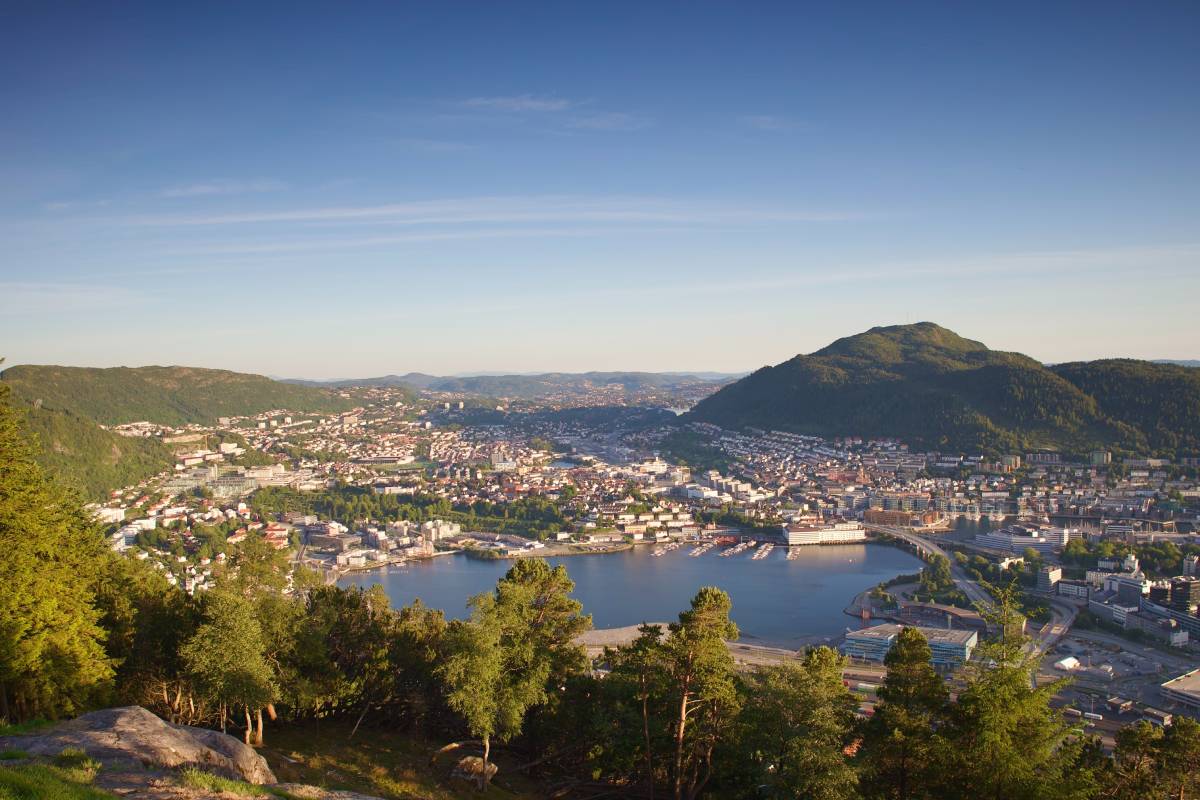EXPLAINED: Why people from Bergen are so proud of their city

Sitting on the west coast of Norway is Bergen, where the strength of the local dialect is only matched by its residents' love for the city.
Bergen is a city that quickly captivates visitors and new residents.
READ MORE: Six things foreigners should expect if they live in Bergen
Often called the "Gateway to the Fjords," this coastal gem boasts remarkable natural and historical attractions, making it an exceptional destination for locals and tourists alike.
However, while the city is widely celebrated for its natural beauty, bustling regional economy, and strong international profile, it also has a reputation for its spirited residents and somewhat unique regional identity.
The locals' strong sense of identity
It's no secret that the people of Bergen hold their city in high regard. In fact, their pride often stands out so much that it has earned them the local moniker of Bergensere. Some Norwegians even jokingly refer to them as "foreigners."
READ MORE: What are locals in Norway's different regions called?
The fact that you'll hear Bergen locals say things like "I'm not from Norway; I'm from Bergen" every now and then only consolidates this perception.
However, this self-assuredness and unwavering love for their city can sometimes come across as a tad overwhelming to outsiders from other parts of the country.
While pride in one's city is not uncommon in Norway, Bergensere often tend to take it to another level.
The city's rich history, spanning over 950 years, has allowed the city and its locals to carve out a unique and influential role in Norway's history.
This influence extends across various sectors, including business, culture, finance, and politics.
Generally speaking, Bergen's strategic location throughout its history, dating back to the Viking Age, has given its residents valuable expertise in multiple industries and sectors (such as the maritime industry) that is both recognised and sought after, both nationally and internationally.
The city's role in Norwegian history
Bergen's significance in Norwegian history cannot be overstated. Founded in 1070 by King Olav Kyrre, the city has served as a leading trading and maritime hub for centuries.
Bergen was a vital point of contact between Norway and the Hanseatic League, a mighty medieval and early modern trading alliance until 1899.
The city is still home to many of Norway's prominent institutions in finance, health, research, education, and culture.
Over the centuries, Bergen has been chosen as the historic seat of government by various kings and nobles, solidifying its importance – and the sense of importance attributed to the city by its residents.

Bergen's strategic location, dating back to the Viking Age, has nurtured expertise among its residents across diverse industries. Photo by Stock Birken on Unsplash
A unique dialect
One unmistakable trait of a Bergenser is their distinct dialect, Bergensk, which can be recognised no matter where they go in Norway.
READ MORE: Bergensk: A beginner's guide to the Bergen dialect
This way of speaking, deeply rooted in Bergen's history, further sets them apart from most Norwegians.
One of the main challenges that often prevents many people from making a smooth transition from, say, the Oslo dialect to the Bergen dialect is pronunciation.
In terms of pronunciation, the Bergen dialect bears a closer resemblance to Nynorsk (one of the two written standards of the Norwegian language along with Bokmål).
Additionally, it's worth noting that the Bergen dialect stands out as one of the two dialects in Norway that employ only two grammatical genders, while most other dialects in the country utilise three grammatical genders.
The dialect also carries remnants of historical languages, including German, Danish, and English, reflecting Bergen's historical position as an international trade hub.
A cherished football club
Brann is Bergen's most well-known football club and one of the oldest in Norway, founded in 1908. For many residents, the club is closely tied to their sense of local pride.
The team competes in the Norwegian top-tier football league, Eliteserien, and has a dedicated fan base (Brann-fansen), who are known for their unwavering – and very vocal – support for the club.
The team plays its home matches at the Brann Stadion, located in the city centre, and its matches often draw enthusiastic crowds, creating a lively and electric atmosphere both on the city streets and in the stadium.
The (very wet) weather – and a feeling of resilience
Bergen is famously known as the "Norwegian Capital of Rain," with frequent rain and snowfall throughout the year.
The city's proximity to the North Sea makes it particularly susceptible to harsh weather conditions.
However, the locals in Bergen have learned to embrace both sunny and stormy days with a certain stoicism. They see their unwavering smiles in the face of challenging weather as a testament to their character.
READ MORE: Oslo versus Bergen: Five big differences between Norway's two largest cities
This attitude is also reflected in the common sayings you'll pick up as soon as you move to the city, such as "There is no bad weather – only bad clothes" and "If you wait for nice weather, you'll never leave the house."
All things considered, it's not difficult to see why Bergensere are proud of their city – Bergen has played a central role in shaping Norway's historical path for nearly a millennium and has many unique traits going for it.
While Bergen locals' deep-rooted pride and identity can occasionally ruffle the feathers of Norwegians from other regions, more often than not, it doesn't stem from arrogance or self-righteousness.
Rather, it originates from an honest place – a profound affection for their city, region, and the rich tapestry of history and culture that envelopes Bergen. This attachment is a testament to their love and respect for their hometown, which they hold dear.
Comments
See Also
Bergen is a city that quickly captivates visitors and new residents.
READ MORE: Six things foreigners should expect if they live in Bergen
Often called the "Gateway to the Fjords," this coastal gem boasts remarkable natural and historical attractions, making it an exceptional destination for locals and tourists alike.
However, while the city is widely celebrated for its natural beauty, bustling regional economy, and strong international profile, it also has a reputation for its spirited residents and somewhat unique regional identity.
The locals' strong sense of identity
It's no secret that the people of Bergen hold their city in high regard. In fact, their pride often stands out so much that it has earned them the local moniker of Bergensere. Some Norwegians even jokingly refer to them as "foreigners."
READ MORE: What are locals in Norway's different regions called?
The fact that you'll hear Bergen locals say things like "I'm not from Norway; I'm from Bergen" every now and then only consolidates this perception.
However, this self-assuredness and unwavering love for their city can sometimes come across as a tad overwhelming to outsiders from other parts of the country.
While pride in one's city is not uncommon in Norway, Bergensere often tend to take it to another level.
The city's rich history, spanning over 950 years, has allowed the city and its locals to carve out a unique and influential role in Norway's history.
This influence extends across various sectors, including business, culture, finance, and politics.
Generally speaking, Bergen's strategic location throughout its history, dating back to the Viking Age, has given its residents valuable expertise in multiple industries and sectors (such as the maritime industry) that is both recognised and sought after, both nationally and internationally.
The city's role in Norwegian history
Bergen's significance in Norwegian history cannot be overstated. Founded in 1070 by King Olav Kyrre, the city has served as a leading trading and maritime hub for centuries.
Bergen was a vital point of contact between Norway and the Hanseatic League, a mighty medieval and early modern trading alliance until 1899.
The city is still home to many of Norway's prominent institutions in finance, health, research, education, and culture.
Over the centuries, Bergen has been chosen as the historic seat of government by various kings and nobles, solidifying its importance – and the sense of importance attributed to the city by its residents.

A unique dialect
One unmistakable trait of a Bergenser is their distinct dialect, Bergensk, which can be recognised no matter where they go in Norway.
READ MORE: Bergensk: A beginner's guide to the Bergen dialect
This way of speaking, deeply rooted in Bergen's history, further sets them apart from most Norwegians.
One of the main challenges that often prevents many people from making a smooth transition from, say, the Oslo dialect to the Bergen dialect is pronunciation.
In terms of pronunciation, the Bergen dialect bears a closer resemblance to Nynorsk (one of the two written standards of the Norwegian language along with Bokmål).
Additionally, it's worth noting that the Bergen dialect stands out as one of the two dialects in Norway that employ only two grammatical genders, while most other dialects in the country utilise three grammatical genders.
The dialect also carries remnants of historical languages, including German, Danish, and English, reflecting Bergen's historical position as an international trade hub.
A cherished football club
Brann is Bergen's most well-known football club and one of the oldest in Norway, founded in 1908. For many residents, the club is closely tied to their sense of local pride.
The team competes in the Norwegian top-tier football league, Eliteserien, and has a dedicated fan base (Brann-fansen), who are known for their unwavering – and very vocal – support for the club.
The team plays its home matches at the Brann Stadion, located in the city centre, and its matches often draw enthusiastic crowds, creating a lively and electric atmosphere both on the city streets and in the stadium.
The (very wet) weather – and a feeling of resilience
Bergen is famously known as the "Norwegian Capital of Rain," with frequent rain and snowfall throughout the year.
The city's proximity to the North Sea makes it particularly susceptible to harsh weather conditions.
However, the locals in Bergen have learned to embrace both sunny and stormy days with a certain stoicism. They see their unwavering smiles in the face of challenging weather as a testament to their character.
READ MORE: Oslo versus Bergen: Five big differences between Norway's two largest cities
This attitude is also reflected in the common sayings you'll pick up as soon as you move to the city, such as "There is no bad weather – only bad clothes" and "If you wait for nice weather, you'll never leave the house."
All things considered, it's not difficult to see why Bergensere are proud of their city – Bergen has played a central role in shaping Norway's historical path for nearly a millennium and has many unique traits going for it.
While Bergen locals' deep-rooted pride and identity can occasionally ruffle the feathers of Norwegians from other regions, more often than not, it doesn't stem from arrogance or self-righteousness.
Rather, it originates from an honest place – a profound affection for their city, region, and the rich tapestry of history and culture that envelopes Bergen. This attachment is a testament to their love and respect for their hometown, which they hold dear.
Join the conversation in our comments section below. Share your own views and experience and if you have a question or suggestion for our journalists then email us at [email protected].
Please keep comments civil, constructive and on topic – and make sure to read our terms of use before getting involved.
Please log in here to leave a comment.